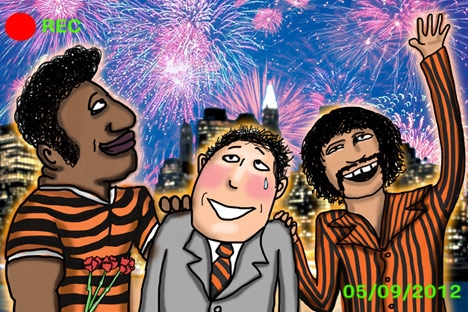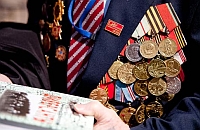Victory Day on both sides of the Atlantic

Drawing by Niyaz Karim
As someone who moved from Russia to the United States as an adult, I know firsthand the difficulties of adapting to life in foreign country. A new language, new culture, new rules of interpersonal relations, new climate and new food all dawn upon you at once.
An intrinsic, if not fully appreciated, part of the adaptation process is getting used to a new set of holidays. This isn’t as trivial as it might seem: the order of American holidays often challenges the biological clock set up back in Russia. Additionally, the meaning of some of them is not always obvious to a newcomer. Eventually you settle, of course. First, you stop celebrating the official Russian holidays you remember from childhood: the Day of the October Revolution on Nov. 7 and the Day of International Solidarity of Workers on May 1. In the United States, Independence Day on July 4 becomes a proxy for both. Then you stop buying flowers for your wife on March 8 (International Women’s Day), although mandatory attendance at an expensive restaurant on Valentine’s Day may not appear to you to be a sensible replacement. Over time, New Year’s Day, the most cherished holiday in Russia, turns into an extension of Christmas. Finally, you realize that Thanksgiving, a day you never heard of before moving to the U.S. — has gradually become your favorite holiday.
There is, however, a Russian holiday that will always find place on my busy
calendar. It’s May 9 — Victory Day, the day commemorating the end of World War
II, known by Russians as the Great Patriotic War. I belong to the first postwar
generation. As a result, my memory of the war can only be called historic,
derived as it was from reading books and watching movies about this part of Russia’s tragic
and glorious past. But although I have no memories of the fighting or the
deprivations of the war years, I have plenty of my own memories of the annual
military parades that take place every year on this day in Moscow’s
Red Square. As a boy, I spent the morning
sitting in front of a TV set, afraid to miss a blink. And then, there were war
veterans filling the streets in the afternoon, their clothes shining with the
gold and silver of military decorations. They looked so old to me back then;
today, I realize that many of them were younger than I am now.
These days, my 87-year-old mother helps my wife and me remember and celebrate
this day. Every year on May 9, the three of us have a celebration dinner. We
eat Russian food, drink vodka and listen to my mom’s stories of life during the
war. My wife and I already know all of them by heart, so we can always add an
important detail that Mom has forgotten since last time. A year ago, she
reminded us how one night in February 1943, she was chased by a stranger who
apparently wanted to rob her of bread stamps she just received. Without looking
back or even screaming, Mom made the run of her life, knowing that should she
lose this race, her parents and two sisters would have no bread for the rest of
the month. Before dinner is over, Mom always tells my favorite story: how she
learned that the war was over. She remembers exactly the time of the day and
the street in Vladivostok
she was on when she heard the radio announcement by the legendary Yuri Levitan.
Sometimes, we’re joined for dinner by our grown-up, perfectly American
children. They are not expected to share the emotional atmosphere of the
occasion; sitting around the table and politely listening to the conversation
is all that is expected from them. As parents, we take pride in the fact that
in contrast to many of their friends — and, I suspect, some U.S. politicians — our kids at least know that
in World War II, the United States
and Russia
were allies, not foes.
This year, Victory Day falls on a weekday, so our kids are unlikely to visit
us. I wish they could. A couple of hours every year is not a high price to pay
for reminding ourselves that the history of mankind doesn’t split along
national borders or generational lines. It’s our common history. And the
victory we are to celebrate on May 9 is not only victory for us and our
parents; it’s also victory for our children and their future children, too.
For our Victory Day and yours! Cheers!
Eugene Ivanov is a Massachusetts-based political analyst who blogs at The Ivanov Report.
All rights reserved by Rossiyskaya Gazeta.
Subscribe
to our newsletter!
Get the week's best stories straight to your inbox
